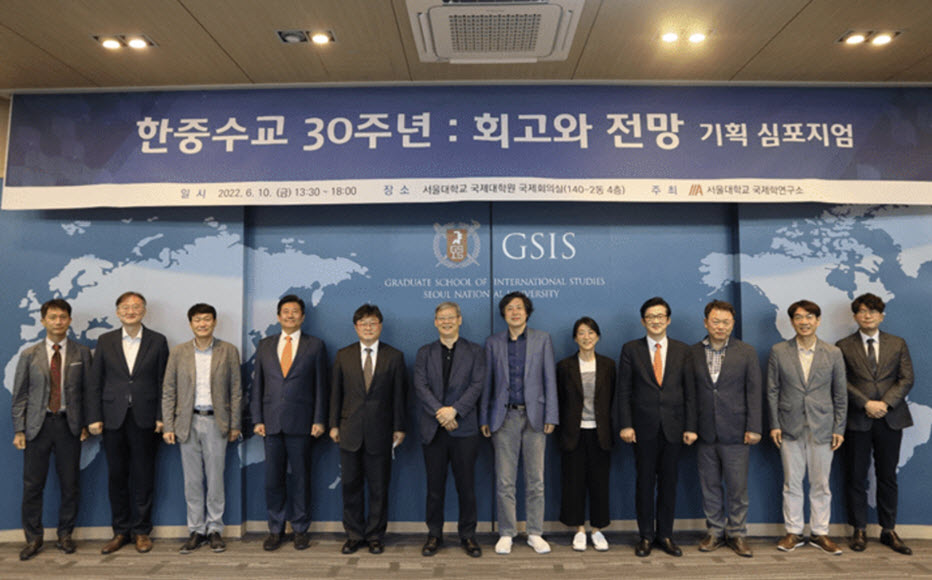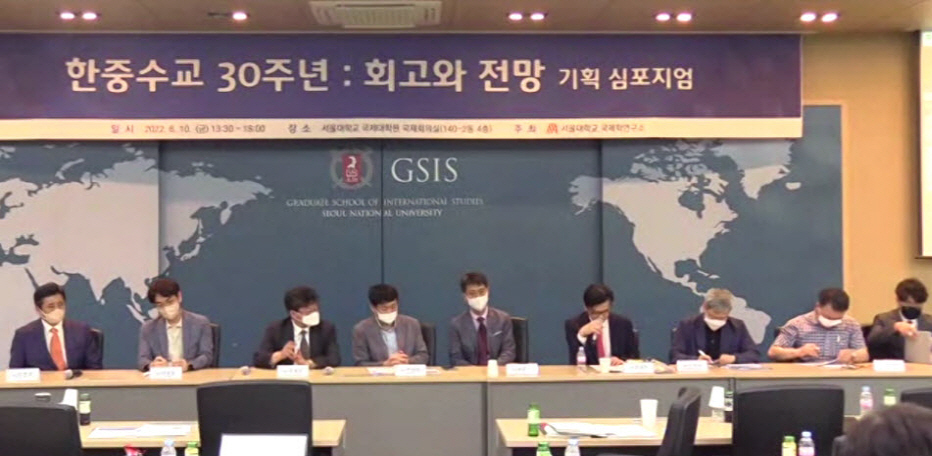2022 marks the 30th anniversary of South Korea’s diplomatic relationship with China. The SNU Institute of International Affairs (IIA) commemorated this milestone in an edition of their quarterly journal Review of International and Area Studies. Prior to its publication, a symposium was held at the Graduate School of International Studies (GSIS) to discuss the articles that would be included. Fourteen experts were invited to share their thoughts on different facets of Korea’s relationship with China, including the development of military, economic, societal, and cultural ties. The event was broadcasted through Zoom and had over fifty audience members attending in person.

The symposium: “China-Korea Relations, 30 Years: Retrospect and Prospect”
In his opening address, IIA director Cheol Hee Park (GSIS) called attention to the significance of the symposium. Park expressed his concern over the heightened anti-Chinese sentiment in public discourse, stating firmly that a top priority for Korea’s foreign policy should be resolving issues between Korea and China.

The panel of experts at the symposium
To start the symposium, Professor Hankwon Kim (Institute of Foreign Affairs and National Security) explained that the history of China-Korea relations could be divided into three stages: those of development, adjustment, and conflict at the tenth, twentieth, and twenty-five year marks, respectively. Although Professor Dongryul Lee (Dongduk Women’s University) applauded the novel approach, he advised that grouping historical events broadly should not supplant the need to analyze their finer details.
Research fellow Hwanwoo Jung (Kotra) then directed the conversation toward economics. Jung described Korea and China’s economic relationship as having undergone three stages as well, those of formation, expansion, and exploration. In response, research fellow Mansoo Ji (Korea Institute of Finance) suggested that 2007, 2013, and 2015 – years that saw greater active investment and trade cooperation – should be analyzed more thoroughly. Next, Professor Taehee Yoon (IIA) reported on an article he co-authored with Professor Jong-ho Jeong (GSIS), that focused primarily on socio-cultural exchange between the two nations. Professor Munyoung Cho (Yonsei University) added that the role of the public should not be overlooked, emphasizing its ability to facilitate exchange through immersion in foreign cultures.
In the debate that followed, Professor Jongho Jung posed a question: “what are the leading factors that continue to define China-Korea relations?” Experts agreed that an imbalance of national power, the generational mindset of young adults, and the manifold elements of U.S.-China relations were among the most significant factors. Jung urged the government to take these factors into consideration for implementing a more principled approach to ongoing relations with China. “Operating on principles rather than for short-term profit is the key to a stable relationship with China,” he asserted. When asked about the symposium’s success, Jung characterized the event as “a project that took on 30 years of history – an objective examination of the past, a prudent assessment of the present, and a means to prepare for the future.”
Source: https://www.snu.ac.kr/snunow/snu_story?md=v&bbsidx=137265
Written by Min Seo Ki, SNU English Editor, mskey717@gmail.com
Reviewed by Professor Travis Smith, Department of Asian Languages and Civilizations, tlsmith@snu.ac.kr

